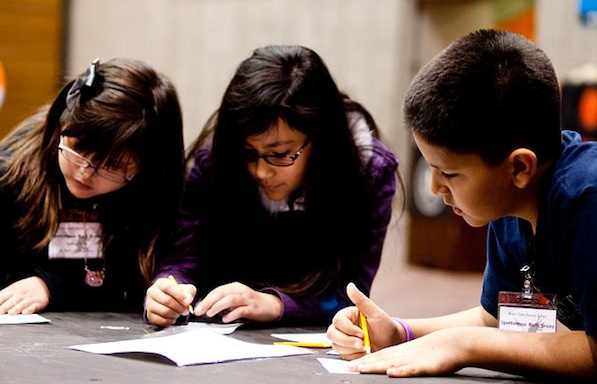One of my secret pleasures is watching fixing shows like Restaurant Impossible and Kitchen Nightmares. It makes going out to eat questionable but I do love seeing the process move from stubborn denial to grateful acceptance.
Last night, my husband and I watched an old Kitchen Nightmares episode where an owner was convinced her food was spectacular, she did a great job running the business and the employees were the cause of her failure. While we watched Gordon Ramsey work his magic (brow-beat her into submission), I started thinking about the teachers I know and the future teachers I work with now in my role as a Field Supervisor. Once a teacher, always a teacher - everything is about learning. I realized that the biggest problem all these restaurant owners have is the inability to check their ego at the door. They are so caught up in what they do brilliantly that they are closed to any idea of changing what they do to make things better. And that is exactly what holds back teachers, too.
When we first begin learning something new, we willingly ask for advice, read up on new ideas, and accept critiques. But once we have learned, even a little bit, we start to shut down. You don't need to teach me how to handle behavior. I've got this. I don't need to learn how to make my projects more inclusive and more engaging. I already know how to create projects. The children love what I do and love coming to class. I'm fine.
By not checking our egos at the door, we are creating a sameness. We allow our classroom to work for just the "average" student, because the rest will come along in their own time. We accept that "that kid" will always just mess up group work and class lessons, because that's what they do. We encourage a baseline of instructional activities that may or may not include engaging activities, may or may not teach all our children, may or may not allow for adjustments as needed. Because there is no need. We have it covered.
So this is a plea to all my educator friends, to all my student interns, to all my administrator connections. Please, check your ego at the door. Allow yourself to be open to learning and growing. Never be afraid to tell yourself and others that, although you know how to handle behavior, there might be some new ideas that will help you teach students how to handle their own behavior. Live with the idea that, although you planned projects for years, there might be new ways to connect with other classes for a project or new ideas to reach every single child in your class during the project.
I clearly remember when I went to Responsive Classroom training. I was a veteran teacher already. I had worked in some of the most difficult inner city schools, knew how to create a "family" so the children would want to behave, and really never had too many issues (except for "that kid"). But I wanted to go to the training because I visited a district where they implemented the whole RC program and I was impressed. So off I went.
It was difficult for me to check my ego. I wanted to prove I really didn't need this. Just give me the games and the posters. I'll do the rest. But, slowly throughout the week of training, I began to see things differently. Maybe "that kid" had much more I could work with than struggles with behavior. Maybe the group project could work better if I taught the children how to work together very explicitly first. Maybe I could make all my students feel special and wanted each and every day - even just by starting the day shaking hands and saying good morning to each child.
The very first year working with RC changed my classroom completely. My students were more excited to be in school. They were more responsible and independent learners. They advocated for their learning. Behaviors were almost completely eliminated. I, the veteran teacher, the expert, could actually learn to change and, in the changing, make things better. Later I learned more about Universal Design for Learning and CAST, which just lent itself perfectly to my RC classroom.
Now that I am retired, I can look back on my career in the classroom differently. I changed grades quite often, moving around in elementary school and even leaving the classroom and working with gifted students and teaching science to all the elementary students. I looped with my class three times, which effectively eliminates duplicating projects, since the children already did said project with me. I created new lessons, units, activities, projects every single year. And I loved it. I loved discovering new tools. I loved working with new teachers, in and out of my school. I loved going to conferences and coming back with new ideas.
I love learning. I still do. I have become a pretty active pickleball player in my retirement. I never even saw the game played before. I am on a 14 day streak in DuoLingo. I will learn Spanish. I will learn Spanish. I have started cooking. (For those that don't know, I never cook. My husband is a great chef so why should I take that away from him. LOL) Now I make soups and casseroles. Still can't handle a meal because the timing throws me but I can make something that is easy to heat up later.
By keeping the learning going, I am forced to keep my ego in check. How will you keep the learning going in your classroom? Go to a conference? Read a new book? Follow someone new online? Be brave. Be a learner. Check your ego at the door and go ask for help. You never know what will come of it.




























